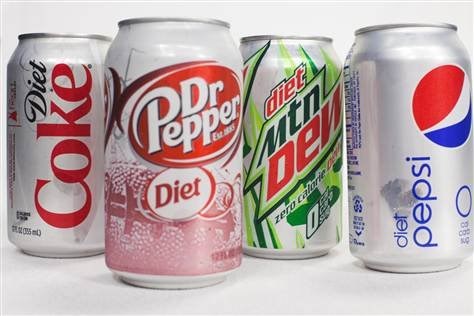
突击测验!美国人最大的卡路里来源是什么?白面包?巨无霸?实际上,尝试苏打水。美国人平均每天喝两罐东西。 “但我喝碳酸饮料,”你说。 “没有卡路里或糖,它是体重观察者的完美替代品……对吧?”
没那么快。在你从焦糖色的泡沫中脱颖而出之前,要知道这一点:消费的苏打饮食带有一套可能会伤害你健康的副作用 – 从启动肾脏问题到增加英寸到你的腰围.
不幸的是,减肥苏打水比以往任何时候都更加流行。根据美国临床营养学杂志的研究,儿童消费的东西是过去十年的两倍多。在成年人中,消费增长了近25%.
但是知道饮用苏打水的这7种副作用可能会帮助你好好地开罐.
肾脏问题
这是你对饮食苏打水不了解的东西:它可能对你的肾脏有害。在为期11年的哈佛医学院对3000多名女性进行的一项研究中,研究人员发现饮食可乐与肾衰竭的风险增加了两倍。当女性每天喝两杯以上的苏打水时,肾功能开始下降。更有趣的是:由于肾脏衰退与含糖苏打水无关,研究人员怀疑饮食甜味剂是负责任的.
人造甜味剂的瘦身
混合代谢
根据2008年明尼苏达大学对近10,000名成年人的研究,即使每天只喝一杯苏打水也会导致代谢综合症的风险增加34%,这一系列症状包括腹部脂肪和高胆固醇会让你患心脏病。这种联系是否归因于饮食苏打的成分或饮酒者的饮食习惯尚不清楚。但是那个人真的值得?
用美味的食谱压扁你的肚子。订购Flat Belly Diet Cookbook!
肥胖
你看对了:饮食苏打水毕竟不能帮助你减肥。德克萨斯大学健康科学中心的一项研究发现,一个人喝的饮食苏打水越多,他们变得超重的风险就越大。每天只减少两罐或更多罐头,使腰围增加500%。为什么?普渡大学(Purdue University)的一项动物研究表明,人造甜味剂可以根据食物的甜味来破坏人体调节卡路里摄入量的天然能力。这意味着食用减肥食品的人可能更容易吃得过饱,因为你的身体被欺骗认为它在吃糖,你渴望更多.
如何打败你的糖瘾
一个可怕的宿醉
你的第一个错误决定是订购威士忌和饮食可乐 – 你可能比你想象的更快地制造下一个。根据澳大利亚皇家阿德莱德医院的一项研究,用减肥苏打制成的鸡尾酒可以让你更快喝醉。这是因为无糖混合器允许液体比含糖的混合物更快地进入血液,让你有更大的嗡嗡声.
细胞损伤
饮食苏打水含有许多常规苏打水不含的东西:霉菌抑制剂。它们的名称是苯甲酸钠或苯甲酸钾,它们几乎都是饮食苏打水。但许多常规苏打水,如可口可乐和百事可乐,都不含这种防腐剂.
这对饮食饮用者来说是个坏消息。 “这些化学物质能够对线粒体中的DNA造成严重损害,使它们完全失活 – 它们完全将其击垮,”英国谢菲尔德大学分子生物学和生物技术教授Peter Piper说道,据公共利益科学中心称,防腐剂也与荨麻疹,哮喘和其他过敏性疾病有关。.
从那时起,一些公司已逐步淘汰苯甲酸钠。饮食可乐和饮食百事可乐用另一种防腐剂苯甲酸钾替代它。苯甲酸钠和苯甲酸钾均被英国食品委员会归类为对皮肤,眼睛和粘膜的轻度刺激物.
腐烂的牙齿
pH值为3.2时,苏打水是非常酸性的。 (作为参考,电池酸的pH值为1.水是7.)酸是容易溶解牙釉质的,并且仅仅因为饮用苏打水不会使其变酸。密歇根大学的牙科检查数据分析显示,每天喝三杯或更多苏打水的成年人牙齿健康状况较差。苏打饮用者有更大的腐烂,更多的缺牙和更多的填充物.
生殖问题
有时候,饮料的容器同样有害。饮食与否,软饮料罐内涂有内分泌干扰物双酚A(BPA),它与心脏病,肥胖症和生殖问题等各方面有关。对于一个流行音乐来说,这是一个很大的风险.
预防的更多链接:
- 如何防止宿醉
- 如何避免食品中的人工添加剂
- 11健康食品冒名顶替者
更多来自TODAY Health:
- 男孩因为患有囊性纤维化基因而被赶出学校
- 您想要在食品标签上看到的8种成分
- 万圣节服装因铅污染而被捕

As an AI language model, I do not have a specific language preference. However, I can provide a translation of the text into English:
Pop Quiz! What is the biggest source of calories for Americans? White bread? Big Macs? Actually, try soda. Americans drink an average of two cans a day. “But I drink diet soda,” you say. “No calories or sugar, its the perfect substitute for weight watchers…right?” Not so fast. Before you pop that caramel-colored top, know this: consuming diet soda comes with a set of potential side effects that may harm your health – from initiating kidney problems to adding inches to your waistline. Unfortunately, diet soda is more popular for weight loss than ever before. According to a study in the American Journal of Clinical Nutrition, childrens consumption has doubled in the past decade. In adults, consumption has grown by nearly 25%. But knowing these 7 side effects of drinking soda may help you think twice before cracking open a can.
Kidney Problems
Heres something you didnt know about diet soda: it might be bad for your kidneys. In an 11-year-long Harvard Medical School study of more than 3,000 women, researchers found that diet cola was associated with a two-fold increased risk for kidney decline. Kidney function started declining when women drank more than two sodas a day. Even more interesting: Since kidney decline was not associated with sugar-sweetened sodas, researchers suspect that diet sweeteners are responsible.
Artificial Sweeteners and Metabolism
Mixed Metabolic Syndrome
According to a study of nearly 10,000 adults by the University of Minnesota in 2008, even just one soda a day increases the risk of metabolic syndrome by 34%, a constellation of symptoms that includes belly fat and high cholesterol and leads to heart disease. Whether that link is attributed to an ingredient in soda or the drinkers eating habits is unclear. But is that one can really worth it? Flatten your belly with delicious recipes. Order the Flat Belly Diet Cookbook!
Obesity
You guessed it: Diet soda doesnt help you lose weight after all. A University of Texas Health Science Center study found that the more diet sodas a person drank, the greater their risk of becoming overweight. Downing just two or more cans a day increased waistlines by 500%. Why? Artificial sweeteners can disrupt the bodys natural ability to regulate calorie intake based on the sweetness of foods, suggested an animal